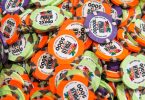An artificial intelligence program has seemingly mastered the art of Heads-Up No Limit Hold’em after defeating four of the world’s best professional players last month.
Liberatus, developed by Carnegie Mellon University, played a total of 120,000 hands over 20 days at Rivers Casino in Pittsburgh – eventually emerging well ahead with theoretical profit of US$1.77 million its rivals Dong Kim, Jimmy Chou, Daniel McAulay and Jason Les.
The result is yet another stunning development in the evolution of AI due to the fact that Liberatus had to not only analyze incomplete information along the way but also bluff.
“The computer can’t win at poker if it can’t bluff,” said Frank Pfenning, who leads the head of the Computer Science Department in CMU’s School of Computer Science. “Developing an AI that can do that successfully is a tremendous step forward scientifically and has numerous applications. Imagine that your smartphone will someday be able to negotiate the best price on a new car for you. That’s just the beginning.”
Liberatus achieved its victory using the Pittsburgh Supercomputing Center’s Bridges computer, which allowed it to compute its strategy throughout. Programmers were also aided by the four players themselves.
“After play ended each day, a meta-algorithm analyzed what holes the pros had identified and exploited in Libratus’ strategy,” said CMU Professor of Computer Science Tuomas Sandholm. “It then prioritized the holes and algorithmically patched the top three using the supercomputer each night. This is very different than how learning has been used in the past in poker.”
Nevertheless, players shouldn’t be too concerned just yet, with researchers admitting that the technology to successfully play against a full table of players remains a long way off.







